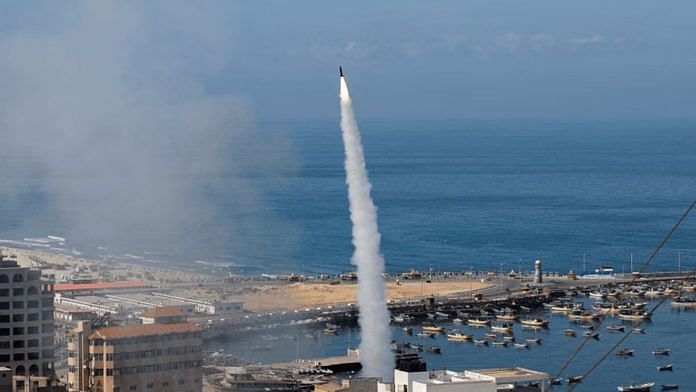Dear God,
The Pakistan Air Force is the reason I was once spanked during the dark hours of a December morning in Jodhpur. Not that they knew I was there, or, for that matter, any of the thousands in the darkened city under curfew as it braced for airstrikes that launched the India-Pakistan war of 1971. Since elders knew there would be a war, bomb shelters had been dug at home. It was all very exciting for me as a child. And as the air raid siren blared, we were hauled from beds and into the shelters. Except that I ran out to see the attacking aircraft.
That’s when Mum’s palms would fly and begin spanking. It would happen every night during the bombing. The sound of the aircraft screaming through the night, the flashes of anti-aircraft fire, the brilliance of the bombs going off followed by their thudding sounds—it was all too electrifying to experience it from the womb of a bomb shelter. When the bombs struck the Indian Army’s fuel oils and lubricants depot, less than a kilometre away as the crow flies, the sky lit up in the most spectacular shades of orange. It was unmissable, and the spanking that followed was just as intense.
In hindsight, it is always easy to make light of that period. But it was terrifying for most others who experienced those moments. More so because unexploded bombs were a regular feature in the findings of the next day, made commonly known by word of mouth since means of communication were wonderfully limited in Jodhpur. Many years later, I relived that experience when Rajvir, a Pakistani relative, recounted an Indian air attack on Karachi and how low the aircraft had flown over their house in the Pakistan Employees Cooperative Housing Society (P.E.C.H.S.). He recalls seeing the pilot’s eyeballs.
Thousands of eyeballs, Dear God, are drying up in Gaza, losing their light as people undergo bombing runs like the one Jodhpur and many other cities experienced in 1971. Come to think of it, I may have had the luxury of treating those terrifying moments as entertainment, but they are pure horror for thousands of similarly aged children in Gaza who have been undergoing that ordeal every day for nearly three months now. Undistilled horror, night after night, day after day, week after week, month after month. Entire families are being erased as living beings.
Also read: Don’t expect a gentler Modi in 2024. He’s already sure of his place in history
A tangled web of destruction
The urban nightmare that was Gaza, or as many have called it the world’s largest open-air prison, is now a tangled mess of destruction. The extent of demolition is now visible even from space, and in seven weeks it has easily outpaced the wrecking of historical Aleppo during the Syrian uprising. With the addition of thousands who remain buried under the debris of destroyed buildings, the death count in Gaza is now well over 20,000, a lot more than what Beirut underwent two generations ago. Late Catherine Leroy captured those images and Tony Clifton wrote searing prose about Beirut in God Cried.
The title is inspired by a poignant Palestinian joke in refugee camps. It was said to be God’s reaction when the former chairman of the Palestine Liberation Organization (PLO) Yasser Arafat asked for freedom. Yet, Dear God, despite your tears, Palestinians continue to resist occupation and pay a heavy price for it. So much so that there is now a new category among their victims, and it doesn’t portend well for the future.
The beleaguered medical personnel serving Gaza find enough unaccompanied children to make a new entry—unknown trauma child. (Tafl sadmä ghair ma’aruf طفل صدمة غير معروف) Given the terrain, and high numbers of such cases, Israel’s Dahiya Doctrine is a certain recipe for disaster.
Replicated in destruction and motivated by similar instincts of combat and survival, the Israelis and Palestinians are locked in a Stalingrad-type embrace. The unequal is overshadowed by the unknowing and it is little wonder that the Germans coined a name for Stalingrad, calling it “Rattenkrieg”— the battle of the rats.
It’s not difficult to see why fighting and surviving in such an abandoned landscape required rodent-like abilities. Defenders generally prevail, despite unequal resources and training. While it is too early to say the same for Gaza, Israel’s withdrawal of its celebrated Golani Brigade is a telling sign.
Brave words aside, Israel’s assault on Gaza is not going to end in a hurry, and it will not yield the strategic military objectives as laid out at the onset of the war. Hamas is not going to be annihilated, and from the scores of Gazan children with ‘unknown trauma’, Israel is creating potential recruits for the future, and more nightmares for itself. Just as it did during the three-year occupation of Lebanon between 1982 and 1985 when it spawned the birth of Hezbollah. So, when Israeli soldiers are already losing equipment to Hamas, it suggests something seriously amiss in Gaza.
Manvendra Singh is a Congress leader, Editor-in-Chief of Defence & Security Alert and Chairman, Soldier Welfare Advisory Committee, Rajasthan. He tweets @ManvendraJasol. Views are personal.
(Edited by Ratan Priya)



